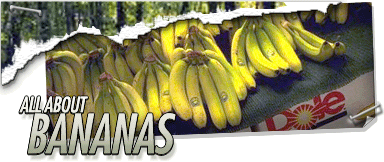
 |
 
Bananas
 
The history of banana production is the history of colonialism, indentured labor and corporate control of economies and governments. It is also a history of deforestation and chemical contamination. Rainforest Relief has embarked on a campaign to change the way bananas are grown around the world. Three of the four largest banana producers are based in the United States: Dole (formerly Standard Fruit), Chiquita and Del Monte (formerly United Fruit Company). The fourth largest producer, Noboa is based in Ecaudor. In order to begin to influence these companies, we have decided to first work with alternative producers to help them gain some market share. We believe that only until we can point to an environmentally and socially sound alternative available in the US, can we begin to campaign to reform the big three. So, we started the ForestBanana™ Project in the Talamanca region of Costa Rica. Coordinated by Hilary Hensler, we are working with cooperatives of farmers growing bananas organically, under the shade of the forest canopy. These growers are for the most part farming only small portions of the land they own or control, the rest being left as montaña — undisturbed forest — to keep their flowing water fresh and keep healthy the wildlife that “works” their farms with them. The situation with these farmers is often dire. Since for the most part they lack the infrastructure of paved roads, and in some cases, they have to transfer bananas from truck to canoe to truck again, the bananas are often bruised and handled roughly. This means that they aren’t fit for export as 'fresh', since consumers buy bananas based on appearance. So the farmers sell their bananas for puré. The only buyer is Gerber (now part of Novartis). Often, Gerber has cut them off, leaving the growers with no market at all. Currently, Gerber is not buying from the coöps. In order to help them diversify their market, we have assisted the farmers in construction of dryers and fabricas (processors for making vinegar). These products are being marketed to the tourist trade in nearby hotels and now banana vinegar is being sold in Whole Foods stores in the US. To date, Rainforest Relief has funded the construction of two solar driers and a vinegar processor. So much more needs to be done. One goal is to eventually enable some of the growers to export fresh bananas to the US. Then we will have an alternative banana for consumers to which we can point. This will make the job of campaigning to reform the industrial producers that much easier. If, on the other hand, we find that fresh export is either not feasible, or that it will change the lifestyle of the growers in negative ways, we will move forward with the campaign armed with the realization that importing a fresh banana from farm to store in seven days sustainably is simply impossible. |
 |

|
||||||||||||||||||||||
 Copyright 2006 Rainforest Relief |
|||||||||||||||||||||||||

